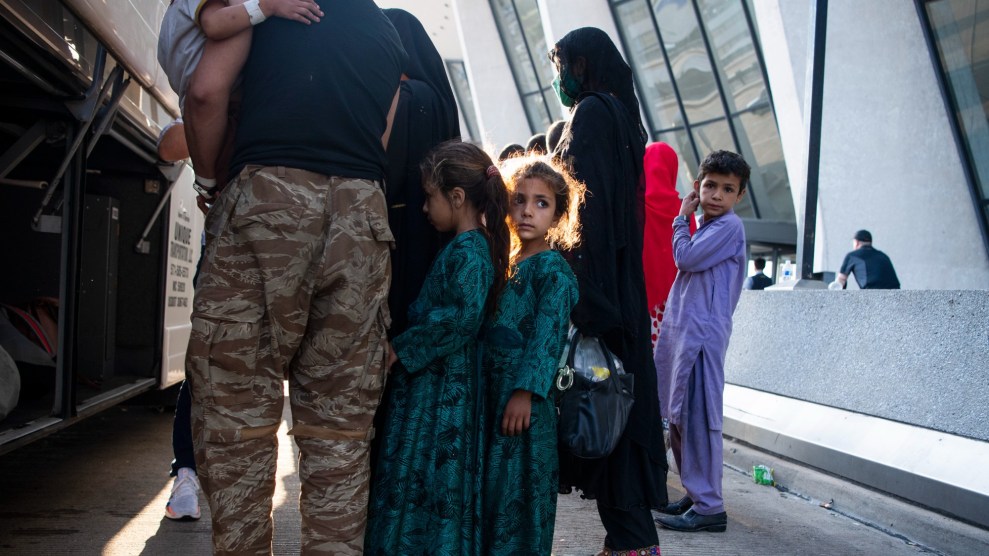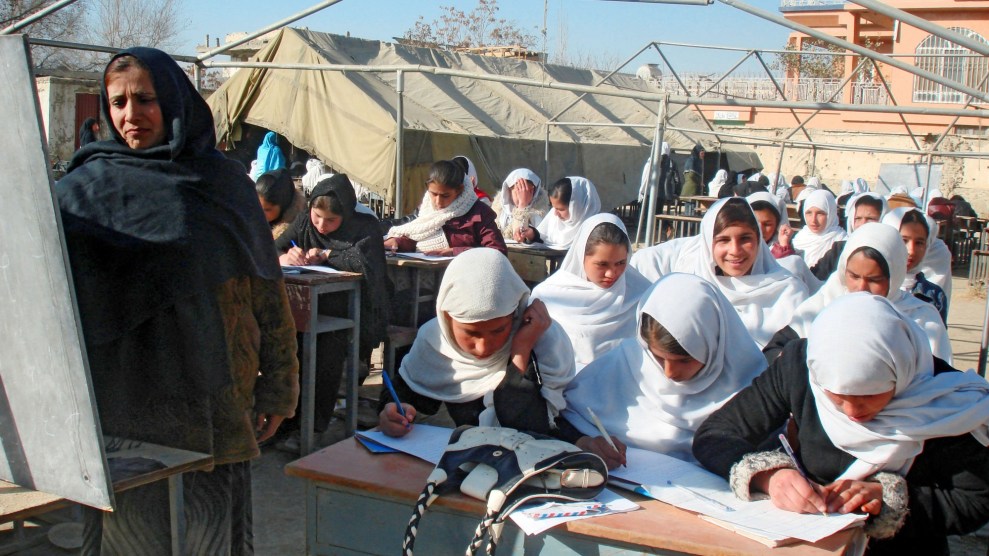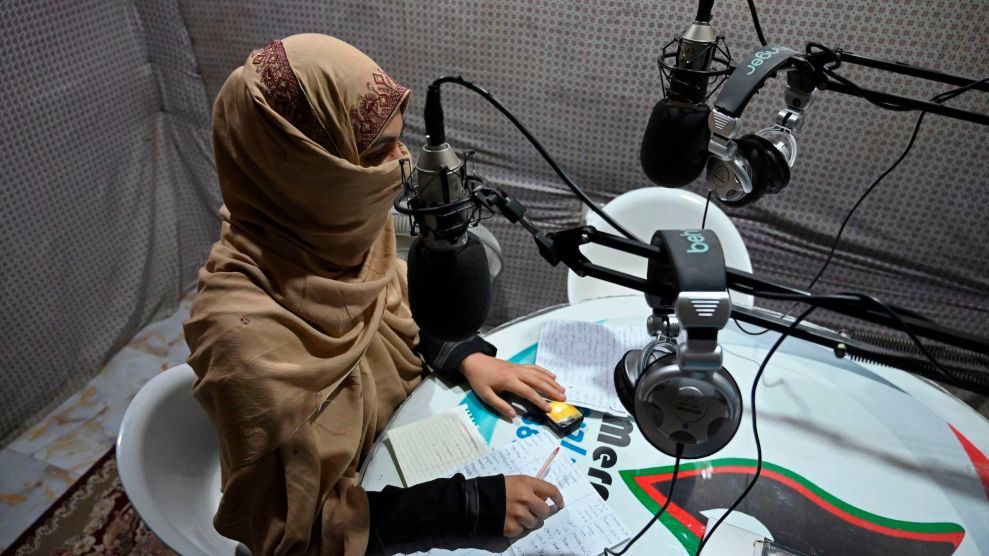
Afghan refugees arrive to Dulles International Airport.Tom Williams/CQ-Roll Call, Inc/Getty
The days and weeks leading up to and following the tumultuous withdrawal of US troops from Afghanistan were chaos for Sharifa Abbasi. The Afghan-born immigration attorney who lives and works in a Virginia suburb of Washington, DC, was barraged by phone calls from desperate relatives hoping to leave the country amidst the Taliban takeover, as well as from Afghans in the United States eager to help their loved ones. “Everyone was calling frantic,” she recalls. “It was a very fluid situation. Things were just changing by the moment over there.”
Abbasi knows what it’s like to have to rebuild a life elsewhere. When she was six years old she and her family fled Afghanistan, which had descended into a civil war following the end of Soviet occupation in 1989, and came to the United States. As the first evacuation flights landed on US soil in late July and early August, she decided to volunteer at the Expo processing center for Afghan evacuees outside Dulles International Airport in Virginia.
Over several days, Abbasi estimates she spoke with and provided some type of legal assistance to more than 100 people who had entered the country with various legal statuses. Some were US citizens or green card holders while others had pending petitions for a Special Immigrant Visa available for Afghans who worked with the US government. Many had only come with the clothes on their backs and hadn’t showered in more than a week. One girl told Abbasi she couldn’t sleep because she still heard the sound of gunshots at night. “The thing that stuck with me the most was hearing their stories and basically experiencing their trauma, because it was so raw and so real,” she says. “You could definitely see the trauma that they’d been through on their faces.” I spoke with Abbasi over the phone about why this work feels personal to her, and how she has witnessed the Afghan diaspora mobilizing to help those whose experiences they understand only too well.
On the immediate response: I had been on the ground at the Expo Center since day one when the first evacuation flights started to arrive for the initial processing of the refugees. From there they would be sent to different military bases. The first thing they would say was, we lived through hell and that’s how we made it here. They were traumatized and completely devastated. Emotional anxiety and stress were at an all-time high. Everybody felt a sense of loss. They lost their country, their investments, their home, their lives. Everything they had worked for in the past 20 years just disappeared overnight. Everybody was shocked about how fast everything happened. You could just sense a great deal of disappointment at how this whole thing was conducted. Not only have they been traumatized from everything that went on while living in Afghanistan, but the whole evacuation process had its own special kind of trauma that all of them endured. There will be consequences and things that they’ll have to work through, that they’re still working through, and it will probably take some time and some good counseling in order for them to heal.
On prolonged detention: There are things that I would have not known at all unless I was there. I was there both as a volunteer and as an interpreter, and that’s when I came to find out that there were a lot of people being held for prolonged periods of time. Their phones and passports were taken away, and their families had no way to contact them. These people are coming new to the country. They don’t know what’s going on. They don’t even know that you can have a lawyer. I had a situation where this woman was about to pass out from crying, and she told me that her son was being held back at the airport. It had been almost 10 days, and she thought that he was detained and that he was being tortured. She was panicking because she didn’t know what had happened to her son.
Family members who were either US citizens or permanent residents living in the United States contacted me informing me that their family member was being held at the airport. With one such person, CBP [Customs and Border Protection] basically made him sign a voluntary withdrawal of admission and sent him back to Qatar. I asked why they were being held, why it was that some were released and some were held, nobody seemed to know anything. They’ve transferred a lot of these people to the Caroline detention center [an Immigration and Customs Enforcement facility in Bowling Green, Virginia]. They’re being held there, and a lot of people are being put into removal proceedings. I’m representing a client who came on the evacuation flights and who is now in immigration court proceedings. The rest of his family was paroled in, but he’s been singled out. He’s been in detention for over a month now. He hasn’t committed any crimes. He came in just like everybody else, he has two US citizen children. He has extended family who live here, and he assisted the US military in Afghanistan. No information is being released to anyone, neither to us nor the family nor the person that they’re holding. He’s not the only one. I know of several other people that are being held there.
On the need for legal services: I spend most of my days trying to get people out of detention or trying to get information and represent them in their immigration court proceedings. Others have been calling and asking about ways to get their family members out of Afghanistan using humanitarian parole. We are swamped filing humanitarian applications for our clients. That seems to be the only option for them. And then we offer legal orientation and workshops on different bases so that we can make sure that people are informed of their legal options. Nonprofits are coming through or trying to collaborate and offer workshops or tutorials and offer pro bono assistance on the humanitarian parole applications. One organization, the Afghan Diaspora for Equality and Progress, has over 4,000 applications that they’re working on. The American Immigration Lawyers Association is holding legal orientation on the bases, basically informing people of their different legal options.
On the parole status that most evacuees are granted: The parole status is good for two years. It’s not any kind of permanent status, and it’s completely distinguishable from a visa which many people mistake it for. It is basically authorization to enter and then to remain in the United States for a period of time. There’s currently a bill in Congress, the Afghan Adjustment Act, that would allow people to apply for permanent residency as long as they’ve been paroled in. If that doesn’t pass, the only option that most of these people have is asylum, but our asylum system is already so clogged up that it is going to create a bigger backlog.
On how the diaspora has risen to the occasion: The Afghan community has really come through in terms of trying to ease this resettlement effort for Afghans. Initially, there was an issue with people who came here on green cards because if you did have a green card or if you were a US citizen, after you registered at the Expo Center you couldn’t go on to the military base. You’re on your own. And a lot of people were from different states. We had this one guy from Texas with his wife and four kids, and he had been out of the country for over a year. He wasn’t able to bring any of his money with him, and he didn’t have any credit cards or anything, so he had no way to get to Texas. The government wasn’t willing to help them. They were basically like okay, you’re just on your own. He was stranded there. And so the community came together and we were able to purchase airline tickets for him and his family. We have donation warehouses where we’ve collected massive amounts of donations and we are working with different points of contact at the different bases to get supplies delivered. Right now, there’s a huge need for winter clothes in Wisconsin because the temperatures have really dropped, so there’s an initiative going on trying to gather winter jackets and winter clothing to get it shipped. We have different task forces all within our own community to try and tackle these issues and do our part to help. I guess that’s one good thing that’s come out of this.
On the collective loss: It’s true that I was born in Afghanistan, but I’ve spent most of my life in the United States. But even for me, who has so little invested in Afghanistan, the fact that they [the Taliban] took down the flag and tore it down and then replaced it with a different flag, just that act in itself was gut-wrenching. I took it for granted. I should have traveled there more. In this entire time, I had only gone back once, and I kept saying I’m going to go back and I never found the time. And then this happened. Now I don’t have a country to go back to. I can never go back there. I’ve lost that chance. When I think of myself and the immense amount of pain that I feel and the grief and loss that I feel, I can only imagine what it’s like for the people who have lived there for the past 20 years, who invested their hearts and souls in building something for themselves in that country and lost all of that overnight. It’s just heartbreaking.
On the challenges ahead: The people who have come here through the evacuation flights got a second chance in life, but when you’ve lost everything, it’s not going to be easy to rebuild from scratch. Especially the ones who actually had good jobs and good lives over there. Now they are here and they have to start over in a foreign country, speak a language they don’t know, and become assimilated into a culture they don’t know anything about. I had to do it myself as a child. When I came here, English was not my first language. I had to learn the way of life here. I remember the sacrifices of my family. I can only feel for these refugees and the difficulties ahead. We’re offering our support in any way that we can, and there’s a lot of resources for them, but they’re still going to have so many challenges that they haven’t anticipated. Most of these people don’t have their support system here; their families have been torn apart. The community here has banded well together, but we can’t be there for them every step of the way to hold their hands. There are going to be moments where they’re going to feel alone and isolated. They have a long difficult road ahead of them.
On the people left behind: I have very close family members who are there. When I tell you the trauma and the grief and the stress every Afghan is basically going through right now, I’m telling you how it is. My uncle calls my mom almost every day crying, saying that his life has turned upside down, that [the Taliban] keeps coming to his house. His son used to assist the US military so they keep asking for his son and basically giving him ultimatums, but his son has left the country. He had a restaurant, they shut it down. Every person who calls me says the same thing: “My family’s in hiding; the Taliban came and took this; the Taliban killed a member of my family already.” Everything that we were afraid of as Afghans, that’s what’s happening to all of us. I think we all feel that hurt, that betrayal. We feel betrayed more than anything that this happened and the entire world just turned its back on us. Our country was snatched away from us and now they’re going in and executing people in front of their family members. Nothing about this transition was right, in any way, shape, or form.
This interview has been edited for length and clarity.















